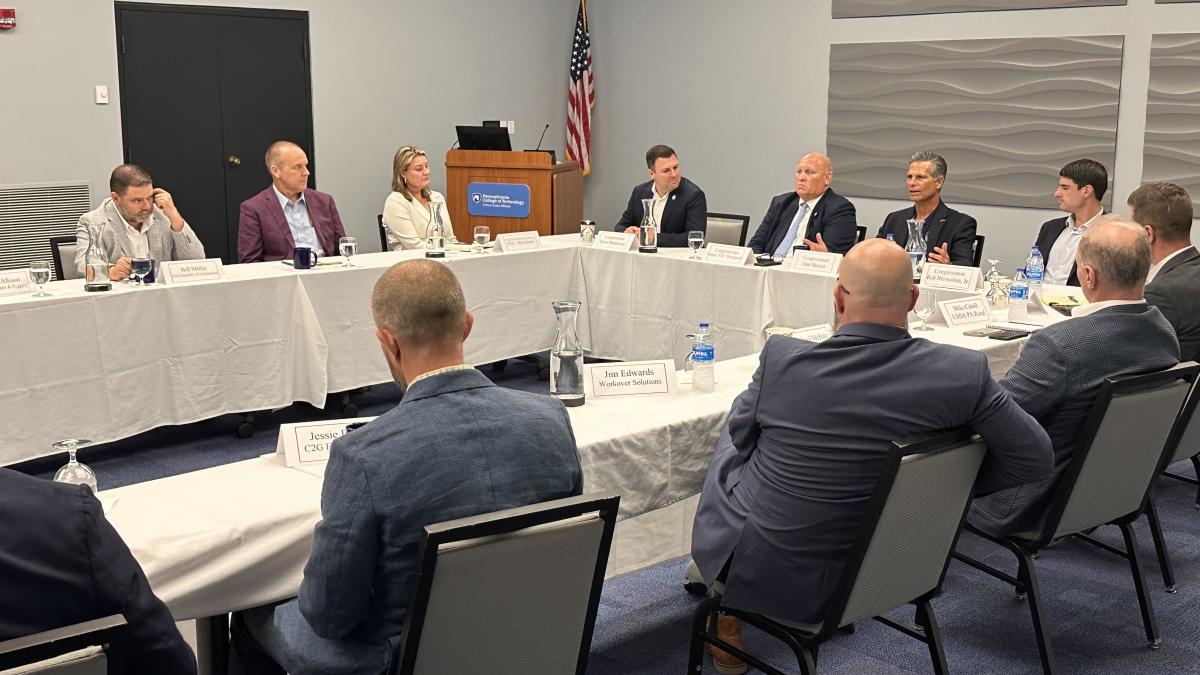Congressman Meuser Participates in Energy, Manufacturing, and Rural Opportunity Roundtable in Williamsport

WILLIAMSPORT, PA – Today, Congressman Dan Meuser (PA-09) participated in a high-level roundtable discussion focused on energy, manufacturing, and expanding opportunity in Pennsylvania’s rural communities. The event was co-hosted by the Pennsylvania Chamber of Business and Industry, Pennsylvania College of Technology, and the Williamsport/Lycoming Chamber of Commerce and brought together Members of Congress, federal officials, energy leaders, and workforce experts to chart a path forward for regional growth.
Held at the Pennsylvania College of Technology’s Thompson Professional Development Center, the roundtable served as a platform to discuss how federal policy can better align with regional success models—especially in workforce development, energy infrastructure, and advanced manufacturing.
“This roundtable underscored the incredible opportunity we have to grow Pennsylvania’s energy economy, support small businesses, and invest in workforce development programs that deliver results,” said Congressman Meuser. “We heard directly from job creators, educators, and innovators who are driving progress in our region. Whether it’s strengthening technical education pipelines, modernizing permitting to meet 21st-century demands, or scaling homegrown energy solutions, today’s discussion was about action—focused, practical, and rooted in what’s working right here in Pennsylvania.”
Congressman Meuser added, “Pennsylvania has the resources, the talent, and the entrepreneurial spirit to lead the next chapter of America’s energy and manufacturing renaissance. From the classroom to the jobsite to the boardroom, our Commonwealth is positioned to lead. Today’s dialogue is part of ensuring that federal policy helps—rather than hinders—that momentum by reinforcing local strengths, removing bureaucratic barriers, and supporting the industries that power our economy.”
The conversation focused on several priorities that will be essential to sustaining Pennsylvania’s competitive edge. These included expanding federal support for career and technical education through corporate tax credit models inspired by Pennsylvania’s EITC program; modernizing infrastructure and permitting processes to attract data centers and meet surging energy demands driven by AI and manufacturing reshoring; unlocking critical mineral recovery from produced water through targeted tax incentives and streamlined federal regulation; and strengthening coordination between federal, state, and local partners to scale successful workforce pipelines and rural economic development strategies.
The roundtable featured three major focus areas:
1. Workforce Development:
Panelists from Penn College, the Susquehanna County Career & Technology Center, and Coterra highlighted how regional models are effectively preparing students for high-skill, high-demand energy and technical careers. Participants explored ways the federal government can replicate Pennsylvania’s Education Improvement Tax Credit (EITC) program at the national level—leveraging private-sector investment to expand career and technical education.
2. Manufacturing & Technology Infrastructure:
Industry innovators emphasized the urgency of upgrading permitting systems and expanding access to reliable energy infrastructure. As energy demand surges—especially with the rise of AI and data centers—speakers stressed the need for regulatory certainty and policies that support domestic production, including new investments in power transmission, siting reforms, and localized supply chains.
3. Energy Services & Small Business Growth:
Representatives from Repsol, Seneca Resources, Costy’s Energy, and others shared real-world perspectives on operating in Pennsylvania’s natural gas fields. Discussions focused on opportunities to extract rare earth elements from brine water, lower emissions, and grow small service companies. Participants also emphasized the importance of stable tax policy, streamlined oversight, and federal support for community investment and workforce partnerships.
The event marked a continued effort by Congressman Meuser and his colleagues to bring federal policymakers into direct conversation with those creating jobs, training the next generation, and building energy capacity across Pennsylvania.
Attendees included:
• Congressman Dan Meuser (PA-09)
• Congressman Glenn “GT” Thompson (PA-15)
• Congressman Rob Bresnahan (PA-08)
• Congressman Ryan Mackenzie (PA-07)
• Amy Van Blarcom-Lackey, EPA Regional Administrator for the Mid-Atlantic
• Mike Cabell, USDA PA Rural Director
• Bill desRosiers, Manager of Government & External Affairs, Coterra
• Dr. Mike Reed, President, Pennsylvania College of Technology
• Jim Edwards, Vice President of Engineering, Workover Solutions
• Jessie Bonnice, President, C2G Energy Services
• Jason Fink, President/CEO, Williamsport/Lycoming Chamber of Commerce
• Lee Borthwick, VP of Digital Campus Development, Power-Bridge
• Michael McHale, Owner, PSA Systems LLC
• Bill Sordoni, President, Energy Valley Project
• Matt Henderson, Principal, Henderson Consulting
• Lynse West, External Relations & Communications, Repsol
• Bill Miller, VP of Membership, Pennsylvania Chamber of Business and Industry
• Sarah Johnson, Costys Energy Services
• John Gazillo, Director, Susquehanna County Career & Technology Center
• Larry Allison, Allison Crane & Rigging
• Rob Boulware, Seneca Resources
• Additional leaders from the private sector, education, and workforce development
Prior to the roundtable, Congressman Meuser toured the Pennsylvania College of Technology to see firsthand how the institution is “Inspiring and Preparing Tomorrow Makers” with a world-class, hands-on education. He met with President Michael J. Reed and Dr. Bradley Webb, Dean of Engineering Technologies, to discuss how Penn College blends real-world experience, innovation, and strong industry partnerships to prepare students for the jobs of tomorrow. Meuser emphasized the importance of supporting institutions like Penn College that are building a more skilled and resilient workforce in Pennsylvania.
###
